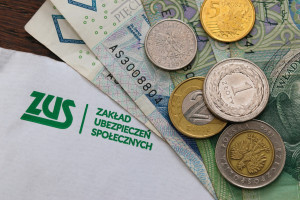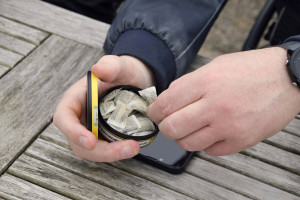200% up from July 1. The price is deliberately prohibitive, and that's not the end

- Members of the Environment, Natural Resources and Forestry Committee and the Health Committee, at a joint meeting on Tuesday, June 3, were briefed on the environmental, health and social risks associated with the use of disposable electronic cigarettes.
- There was talk about fictitious segregation and recycling of used disposable e-cigarettes
- The intention to introduce a ban on the sale of such products was also discussed.
Deputy Minister of Health Wojciech Konieczny spoke about the need to limit the use of tobacco products by young people in Poland.
- The dynamic development of the disposable electronic cigarette market significantly increases the risk of increased access of young people to tobacco products - he pointed out.
Hence - as he said - in March, a draft amendment to the act was included in the government's agenda, which envisages the introduction of a ban on the sale of disposable electronic cigarettes.
- The amendment to the Act of 9 November 1995 on the protection of health against the effects of using tobacco and tobacco products is necessary due to the urgent need to limit the use of disposable electronic cigarettes by young people - explained Wojciech Konieczny.
- These products pose a clear threat to public health, especially the young generation of non-smokers, which necessitates the introduction of a total ban on the introduction of single-use electronic cigarettes to the market - he added.
The proposed amendment – as he said – envisages a ban on the introduction of disposable e-cigarettes to the market, both those containing and not containing nicotine.
As he recalled, the introduction of such a ban requires the consent of the European Commission, i.e. notification of the act.
Deputy Minister Wojciech Konieczny indicated that advanced work on introducing a ban on disposable e-cigarettes is already underway in France. Similar bans are also being introduced in Belgium and the Netherlands.
The Deputy Minister of Health also referred to data on the number of young people using disposable e-cigarettes in Poland.
- In the case of young people aged 13-15, in 2022, electronic cigarettes were used by about 23.4 percent of girls and 21.2 percent of boys - he said. He noted that these results are confirmed by the WHO report, which indicates Poland as the country with the highest percentage of minors who have ever used this type of product.
- In Poland, the percentage of people aged 15-19 who have ever tried electronic cigarettes has increased from 16.8 to 62.1 percent - he warned.
He also provided data confirming the increase in supply. According to data from the Chemicals Office, 6,906 types of disposable electronic cigarettes containing nicotine were reported in 2023. In 2023, the declared sales volume was about 20 million pieces. In 2021, it was 2 million pieces.
- WHO indicates that there is strong evidence that using e-cigarettes increases the chance of smoking traditional cigarettes by about three times, especially among young people - he warned. He also spoke about other health effects of using e-cigarettes.
- Liquids in disposable e-cigarettes heated at high temperatures create new and poorly understood chemical compounds. They almost always contain nicotine, and the addition of flavorings significantly increases the toxicity of the aerosol - he explained.
Harm to the environment and lack of effective recyclingAnother argument for banning the sale of e-cigarettes, as Wojciech Konieczny said, is the harmfulness of the remains of disposable e-cigarettes to the environment, and these include casings, lithium-ion batteries and harmful substances that pose an environmental hazard.
Deputy Minister of Environmental Protection Krzysztof Galos reminded that e-cigarettes as electronic equipment are subject to the collection obligation . He admitted, however, that they are not separated as a separate category, but are classified as small electronic equipment. There is also a lack of systems for recycling these products. Effective recycling could be ensured by higher recycling fees from manufacturers or distributors.
Used e-cigarettes should currently be delivered to PSZOK or accepted at points of sale, but most often they end up in mixed waste and from there in landfills, where they decompose and often cause fires because they end up there with a charged battery.
Urszula Pasławska, Chairwoman of the Committee on Environmental Protection, Natural Resources and Forestry, warned that when it comes to data on the sale of disposable e-cigarettes, there is talk of as many as 100 million pieces sold annually that are not recycled and therefore end up in the environment.
- We have a huge burden on the environment, the health of young people in particular, and in addition, it is a product that is largely imported from China, where the sale of this product is prohibited - she said.
July 1, the price of disposable e-cigarettes will increase by up to 200 percentIt may take some time to introduce a ban on the sale of disposable e-cigarettes, but increasing excise duty and the price of disposable e-cigarettes may prove to be an effective measure in reducing the consumption of these products, especially among young people.
Cezary Komorowski from the Ministry of Finance informed that the Minister of Finance has already taken steps in this regard.
As he explained, it is about introducing a roadmap for e-cigarette liquid regardless of nicotine content.
- The map includes annual successive increases in excise duty on this product by 75 percent, 50 percent and 25 percent in subsequent years, from 55 groszy to 1.8 PLN per milliliter - he said.
It is also about " the introduction of excise tax on vaping devices, including e-cigarettes, tobacco heaters, multi-functional devices, in the amount of PLN 40. This change will come into force on July 1 this year ."
He added that in order to avoid cases of evasion of this tax, it also covers sets of parts for these devices. A set of such parts will also be taxed.
- In order to effectively burden disposable e-cigarettes similarly to reusable devices, the excise tax on the liquid contained in disposable e-cigarettes has been increased to PLN 40 per unit of such a device, which will result in an increase in the retail price of this type of device by approximately PLN 50 per unit from July 1, 2025 - he indicated.
This means that the price of such a device will increase from the current price of around PLN 30 to PLN 80-90 - "which should significantly limit the supply of these products on the market".
In addition, from 1 August, excise duty was introduced on nicotine sachets, other nicotine products and novel nicotine products.
As indicated by Deputy Minister of Health Wojciech Konieczny, the planned ban on the sale of disposable e-cigarettes, the ongoing work on such solutions in the European Union, or the limitations on financial availability resulting from the increase in excise duty - may already have an impact on the limitations of the market for the sale of these products in Poland.
This would be indicated by information presented by Kinga Mroziewicz-Ciach from the Chemical Substances Office, where manufacturers or distributors are required to report a new product 6 months before introducing it to the market. The report includes, among other things, specifying the composition, nicotine dose, and a description of the components. This year, the office received 65 e-cigarette reports, but the fee was paid only for two applications. Meanwhile, an application without a fee is not processed, so the product cannot be placed on the market.
- We can expect a certain limitation of sales, knowing that the ban is imminent and various ways of distribution, packaging - are not very profitable. Before these bans come into force 100 percent, these sales will become unprofitable in the long run. Hence, perhaps the number of notifications and fees, it is the effect of the fact that the legislation is moving forward - said Wojciech Konieczny.
Copyrighted material - reprint rules are specified in the regulations .























































